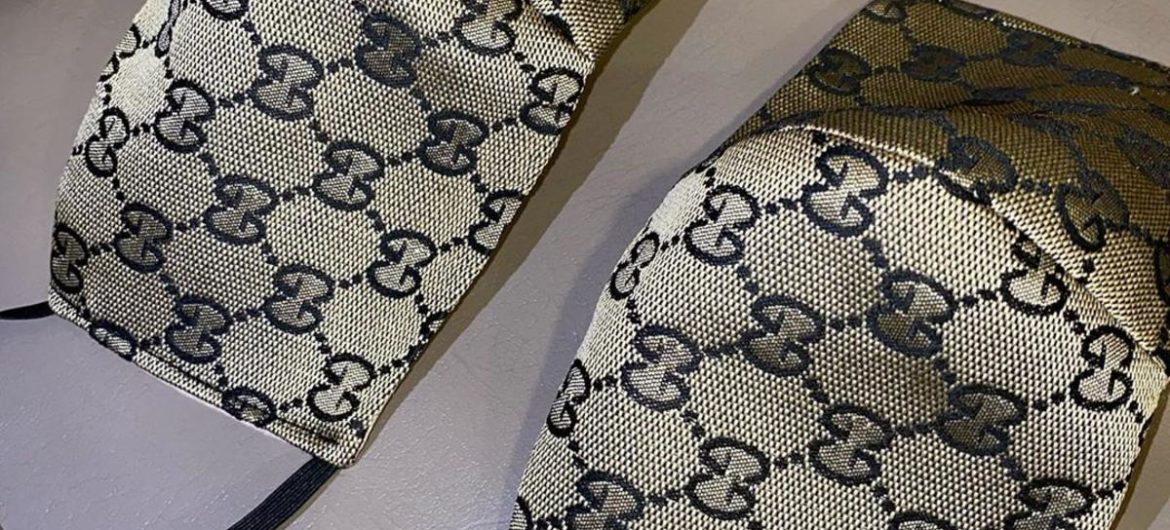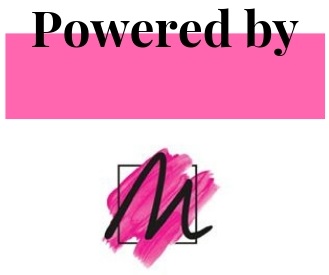With face masks now compulsory in shops and on public transport, it’s no surprise fashionistas are looking for stylish versions of the essential accessory.
But experts have warned that copycat producers who are ripping off the logos and prints of designer brands are contributing to an underground community of counterfeit goods across the world, experts have warned.
The trend is being fuelled by influencers with hundreds of thousands of followers promoting fake designer goods on their Instagram accounts – and according to a recent report by the BBC, it could be costing the legitimate economy billions.
Over the past couple of months, the likes of Maya Jama and former Love Island contestants Amber Rose Gill and Tyne Lexy Clarson have been spotted sporting face coverings featuring Gucci and Louis Vuitton emblems.
However, Jama’s mask was a rip-off courtesy of Lux Masks Global, which according to its website, specialises in ‘custom made one-off fashion accessories’ inspired mainly by ‘Italian designers to ensure the highest quality’.
The unisex masks, which are designed to look like Louis Vuitton products, retail at approximately £45 (R1017) each.
Australian model Jessica Hart also shared an Instagram snap of her modelling a leather face mask featuring the LV logo.
A genuine LV mask is more likely to set you back several hundred pounds. The French fashion house hasn’t produced a standard covering available to the masses.
It did, however, repurpose several of its workshops across France to ‘produce hundreds of thousands of non-surgical face masks’ for healthcare workers.
Some influencers like Tyne Lexy Clarson, who has more than 400,000 followers, are promoting the fake designer fashion labels and directing fans to the counterfeit pages to buy the goods.
A Ghost Data report on Instagram counterfeiting last year claimed the industry is on track to reach a net worth of £1.39 trillion by the end of 2020.
In 2019, around four million Instagram posts or stories relating to fashion brands were promoting counterfeit products, with as many as 95 million ‘bots’ posting as real accounts.
Google search data carried out by the printing company Awesome Merchandise has revealed the term ‘fake prints’ is a growing trend during lockdown.
There are dozens of Instagram accounts which advertise counterfeit goods for a fraction of the price of what the authentic brand would cost.
With most fake accounts selling counterfeit merchandise uploading posts at a high frequency every day, the damage to the creators of the legitimate products can be extremely severe.
When it comes to clothing and accessories, face masks are the latest item to be utilised, with counterfeit designs promoted by influencers with huge followings.
They’re not difficult to find; on Amazon, a search of ‘designer masks’ brings up a results page featuring a faux-Burberry mask that replicates the brand’s signature tartan print.
Paigey Cakey, an MC, singer and actress from Hackney, east London with over 289,000 followers, sported a fake Louis Vuitton mask crafted by OneKind Customs, which she tagged in a post in June.
Influencer Cinzia Baylis Zullo shared a photo of herself wearing a Dior print mask by VSOPCAM, and British YouTuber Cassie Thorpe posed in a Chanel mask she crafted herself.
Luke Hodson, founder of the printing company Awesome Merchandise, told FEMAIL: ‘Counterfeit products are nothing new, but it’s not surprising the community is growing, particularly on Instagram, due to the easy access of printing and free versions of design tools such as Photoshop.
‘Fake designer prints are easy to replicate on items such as masks due to their simple shape, which makes them easy to produce en-masse. With demand at an all time high, more and more businesses are launching on Instagram and targeting influencers to promote their counterfeit products.
‘Supporters of these counterfeit products forget that for the designers and artists behind the piece of artwork, be it in a print or on a piece of clothing or merchandise, a huge amount of time has been devoted to creating them.
‘From the initial concept to developing and refining the idea, it’s a skillset that is very special and unique, and shouldn’t be taken for granted.’
Phil Parkinson, head of commercial law at Blacks Solicitors, added: ‘Not only has money been spent on creating the concept and brand, but will also have been spent on legally protecting the brand as well.
‘Counterfeiters will be fully aware that they are using someone else’s property – in this case, intellectual property – and profiting from it.
‘Whether a brand has registered a logo or name or not, and in most cases they will have done so, that brand, designer or content creator has the right to use their own property and when another party uses it, they are very likely to be the subject of legal action.
‘This could be a claim for damages or a notice to cease production or more likely a mixture of the two.’
For more information about Awesome Merch head to their website https://www.awesomemerchandise.com/ .





